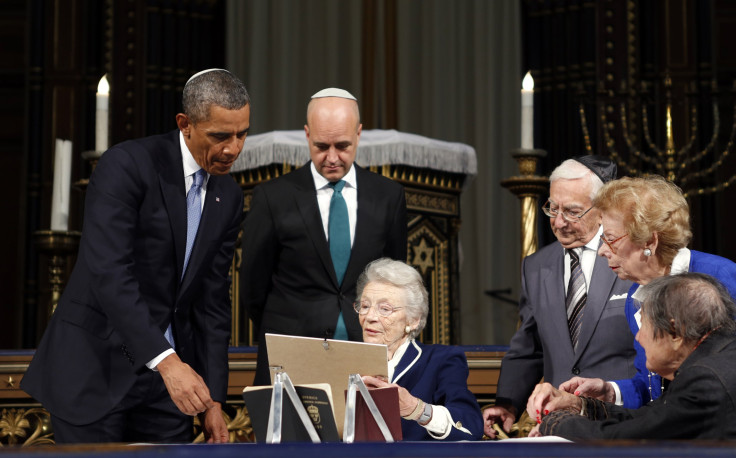What You Missed In President Obama's Speech On Syria: How One Swedish Hero Saw The Nazis Cross The 'Red Line' And Chose To Act

U.S. President Barack Obama, while visiting Sweden Wednesday, reiterated that the world has set a "red line" on Syria. During the news conference on his Stockholm visit, which was hastily arranged after a meeting with Russian President Vladimir Putin was canceled after relations became strained due to the Edward Snowden saga and the possible Syria intervention, Obama was pounded by questions about what actions he may take and what the timeline of an intervention may be. Predictably, his answers revealed very little except for what we all already knew: He wants U.S. forces involved.
For Obama, this could dominate the remainder of his presidency and perhaps even be his legacy as president.
But what you may have missed in Obama’s speech was the modern-day relevance of Swedish hero Raoul Wallenberg, who, while serving as Sweden’s special envoy in Hungary during the last days of World War II, was said to have saved as many as 100,000 lives and the last Jewish community in Europe at that time.
While unknown to most, Wallenberg is as important to the history of the Holocaust as Oskar Schindler, the savior of 1,200 Jews in Poland and the subject of a Steven Spielberg movie.
“Wallenberg’s life is a challenge to us all -- to live those virtues of empathy and compassion, even when it’s hard, even when it involves great risk,” said Obama. “He came from a prominent family, but he chose to help the most vulnerable. He was a Lutheran, and yet he risked his life to save Jews. 'I will never be able to go back to Stockholm,' he said, 'without knowing inside myself I’d done all a man could do to save as many Jews as possible."”
Wallenberg had diplomatic immunity while in Budapest and used it to set up 32 safe houses that he designated as Swedish territory, enabling thousands of Jewish people to hide inside. As the city's remaining Jews lived in fear from the fascist Arrow Cross party governing Hungary at the time, he put up various signs claiming that the premises were Swedish administrative buildings such as “The Swedish Library” and the “The Swedish Research Institute.” He also placed large Swedish flags over doors to help with the deception. It worked.
One of his most daring stunts was when he climbed on top of the roof of a German train about to leave for Auschwitz and began handing out forged passports to the desperate occupants of the carriages. He was shot at by Arrow Cross and German soldiers but calmly continued to give them out. Once he’d finished he ordered all those with the passports to leave the train and walk to other cars nearby, all marked in Swedish colors.
Nearly 70 years later, his decision, that ultimately became his own legacy, was replicated in some part by Swedish Prime Minister Fredrik Reinfeldt, who said in his speech, standing side by side with Obama, that he would allow all Syrian refugees who had arrived in Sweden to stay for good. While there was no immediate danger of them being sent back to the war-torn country, that one decision will mean that around 8,000 people will be given permanent residence permits and can now begin to integrate into Swedish society. They will be housed quickly, their children will be found school places, and they will be offered free Swedish lessons. In addition, they have the right to bring their families too. This adds to the 14,700 Syrian asylum seekers who have arrived in Sweden since the civil war in their country began in 2011.
Like the Syrians, thousands of Wallenberg’s Jews ended up in Sweden, living the sort of lives that they may not have even been able to dream of before Wallenberg placed a passport in their hands on a train destined for Auschwitz, or found them a bed in one of his 32 safe houses.
“He bluffed his way through,” said the late Tom Lantos, one of the Jews he saved, who later served in the U.S. House of Representatives. “He had no official authorization. His only authority was his own courage. Any officer could have shot him to death. But he feared nothing for himself and committed himself totally. It was as if his courage was enough to protect himself from everything.”
Wallenberg was eventually captured by Soviet forces during the siege of Budapest, and it is rumored that he was killed in 1947 while in Lubyanka Prison in Moscow, at the age of 34 -- although various sightings have been reported over the decades. Russia has had a number of enquiries into his death, the last coming in 2012 when his family, who has asked Obama to peruse answers on their behalf, was told that the case was still open.
When Wallenberg was confronted with the "red line" of the Holocaust and the horrific sight of Jews being taken to concentration camps, his life was on the line and perhaps the neutrality of his country, but he chose to act. Undoubtedly, had his safe houses been discovered and the Jews slaughtered, history would remember him differently. The fact is he did, and it worked.
Faced with his own "red line," Obama holds the ultimate final decision on whether to intervene in Syria. On one hand, he’ll be called a war-mongering president who could be responsible for the deaths of many civilians should U.S. forces bomb the country. On the other, he could end up being the president who, in the face of chemical weapons use, did nothing. Whatever happens, the name Obama and the war in Syria will undoubtedly be remembered in tandem for generations.
© Copyright IBTimes 2024. All rights reserved.






















